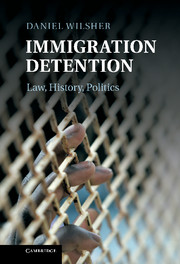Book contents
- Frontmatter
- Contents
- Acknowledgements
- Introduction and overview: free movement of persons and liberty of the person
- 1 The creation of immigration detention: from free movement to regulated borders in America and the United Kingdom
- 2 Modern immigration detention and the rise of the permanent bureaucratic enterprise
- 3 International law and immigration detention: between territorial sovereignty and emerging human rights norms
- 4 Negotiating detention within the European Union: redefining friends and enemies
- 5 Security and immigration detention: the problem of internment in peacetime
- 6 Global migration and the politics of immigration detention
- 7 Restoring the rule of law and influencing politics: placing boundaries around detention
- Bibliography
- Index
- References
2 - Modern immigration detention and the rise of the permanent bureaucratic enterprise
Published online by Cambridge University Press: 05 November 2011
- Frontmatter
- Contents
- Acknowledgements
- Introduction and overview: free movement of persons and liberty of the person
- 1 The creation of immigration detention: from free movement to regulated borders in America and the United Kingdom
- 2 Modern immigration detention and the rise of the permanent bureaucratic enterprise
- 3 International law and immigration detention: between territorial sovereignty and emerging human rights norms
- 4 Negotiating detention within the European Union: redefining friends and enemies
- 5 Security and immigration detention: the problem of internment in peacetime
- 6 Global migration and the politics of immigration detention
- 7 Restoring the rule of law and influencing politics: placing boundaries around detention
- Bibliography
- Index
- References
Summary
Introduction: the aliens power and the new politics of enforcement
This chapter explores the political and legal evolution of detention since World War Two, particularly over the last thirty years. As we saw, the ‘aliens power’ had been firmly established in legal doctrine as a, now separate, descendant of the war power. Although extended alien detention had generally been reserved for wars or national security situations, this power had the potential to foster more permanent restrictions. Courts had not found a clear jurisprudential or political reason to apply basic constitutional safeguards to unwanted aliens, non-parties to the social contract. Detention had been glossed over as a ‘necessary’ part of deportation or as ‘temporary confinement’. Detainees were deemed ‘not to have entered’, despite being incarcerated. The legal foundations were thus firmly in place for employment of mass detention should the political conditions arise.
The immediate decades after World War Two were ones of economic recovery during which migration was often openly encouraged. Barring national security scares, there was no sense of crisis around borders. This had changed decisively by the 1970s when a new and diffuse climate of fear over migration emerged. Those simply entering or arriving without permission, whether seeking asylum or economic opportunity, became seen as a ‘security’ threat. The period since has witnessed the full flowering of the illiberal potential of the aliens power, with a massive expansion of detention facilities in peacetime. Justification was sought in a range of bureaucratic instrumental goals; as a deterrent to irregular migration outside of permitted channels, to secure removal or maintain the ‘integrity’ of immigration laws and as a form of public or national security precaution. However, the increased hostility toward migration in public debate also meant that expanded detention had politically symbolic dimensions. It marked out more clearly the liberal state's capacity for extraordinary measures against ‘outsiders’ to protect ‘insiders’. The permanent emergency had arrived.
- Type
- Chapter
- Information
- Immigration DetentionLaw, History, Politics, pp. 57 - 118Publisher: Cambridge University PressPrint publication year: 2011



